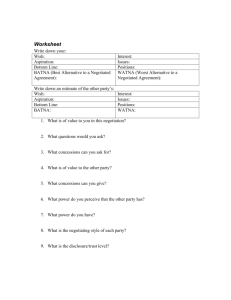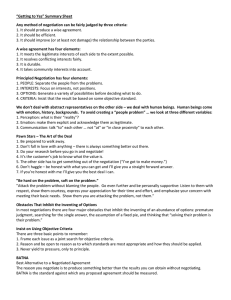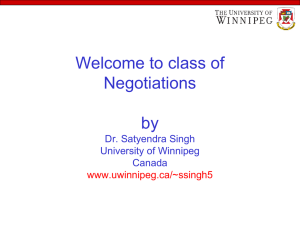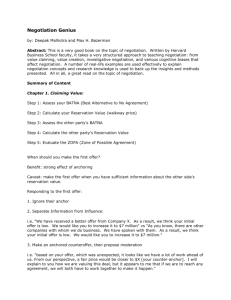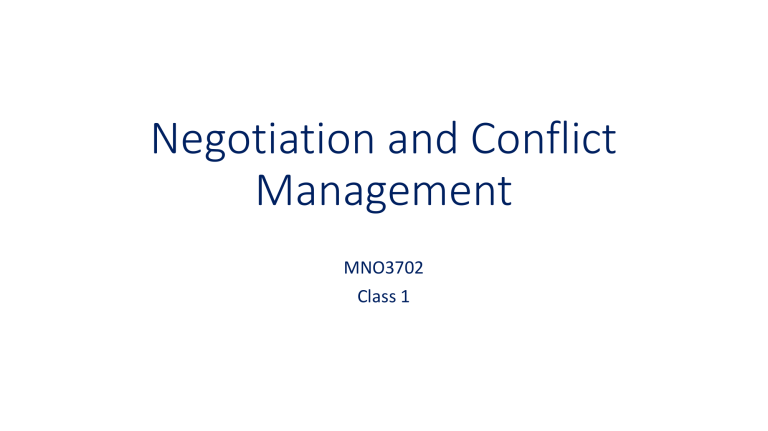
Negotiation and Conflict Management MNO3702 Class 1 Agenda ▪ ▪ ▪ ▪ Welcome to the class! Course Overview Negotiation Exercise – Creamery@Holland Exercise Debrief Who we are? Who we are? Instructor Teaching Assistant Ameek Kaur Vivian Yee Theng Getting to know you Course Overview Background Negotiation is an interpersonal decision-making process necessary whenever we cannot achieve our objectives without support from others. When two or more parties need to reach a joint decision but have different preferences, they negotiate. We negotiate all the time whether we know it or not. Negotiation is a core leadership competency. Negotiation Myths/Facts Negotiation Myths/Facts ▪ Negotiators are Born Mindsets about intelligence beliefs 1. Incremental Theorists: I am work-in-progress 2. Entity Theorists: I am a finished product Negotiators who hold an incremental belief, outperformed those who hold an entity belief (Kray & Haselhuhn, Journal of Personality and Social Psychology, 2007) ▪ Negotiators are aggressive • Should adapt the appropriate strategy ▪ Negotiation skills are intuitive • Need to watch out for biases, planning is important ▪ Negotiators become better with experience • Experience is an expensive way to learn • Simulation-based negotiation classes provide risk-free setting Course Objectives Course Objectives ▪ Improve negotiation skills • Overcome habitual pattern of responding (e.g. reciprocity, fixed pie belief) • Increase communication, listening, and conflict management skills ▪ Increase your capacity to understand and predict the behavior of individuals and groups in competitive situations • Experiment with various negotiating strategies • Take risks and assess your negotiating behavior in a “safe” environment ▪ Examine behaviors of others and see how they react to you • Compare the success of your strategy to those used by others Course Objectives ▪ Get feedback on your interactions with others • What did you do right • What did you do wrong ▪ Develop a toolkit of useful negotiation skills, strategies, and approaches • Claim value • Create value • Build trust Understand that there is no “cookbook” solution Syllabus ▪ Readings – after class ▪ Attendance policy • If you must miss a class, please inform your TA in advance ▪ Honor code • You may never show your role materials to your counterpart • You can tell your counterpart anything you want, but no violence please! Also, • You cannot make up facts that may change the power distribution of the exercise • There may be consequences to your words and actions • Class discussion stays in class • Class material is copyrighted Course Roadmap Class 1 Class 2 Class 3 Class 4 Distributive Negotiation Integrative Negotiation Influence Advanced Integrative ABC/Local 190 Ongoing Negotiations Class 7 Class 5 Class 9 Class 6 Class 8 Agents Dispute Resolution Class 10 Group Negotiation Debrief Class 11 Class 12 Multi-party, Cross-culture Negotiation Module Closure Course Assessment Course Assessment (Extrinsic Motivation for learning) ▪ Attendance & Class Participation (20%) ▪ Planning Documents • • • • ▪ You should prepare planning documents for all your negotiations Submit the document for Cookbook (work with a partner) by Class 4 Bullard Houses (5%) due Class 6 Viking (5%) due class 8 Post-negotiation Analysis (20%) • On any of the exercises or overall experience, due 19 Feb 10PM ▪ On-going Group Negotiation – ABC/Local 190 (25%) • Planning Document for ABC/Local 190 Round 1 (5%) due Class 5 • Outcome for ABC/Local 190 Round 2 (5%) due Class 7 • Group Negotiation Journal (15%) due 19 Mar 10PM ▪ Reflection Journal (25%) – due 16 Apr 10PM Learning Tips (Intrinsically driven) Learning Tips (Intrinsically driven) ▪ BEFORE: • Prepare well for your respective roles (play the part) • Think critically about the previous lesson ▪ AFTER: • Reflect on the experience • What worked well, what didn’t go so well, what changes to make for the next time • Read about the topic covered in class Negotiation Exercise: Creamery@Holland ▪ Preparation – 15 min ▪ Negotiation – 20 min Negotiation Exercise: Creamery@Holland ▪ Restaurant takeover deal ▪ Seller: Travis from Tanaka’s Tavern ▪ Buyer: Carol from Creamery ice cream chain Debrief ▪ Fill your results in the google sheet (link posted in Canvas Announcement) Discovery: Analysis & Planning ▪ How did you prepare? ▪ What did Carol find out about Tanaka Tavern? ▪ What did Travis find out about the Creamery? ▪ What were your goals? Key Negotiation Principles ▪ ▪ ▪ ▪ Best alternative to negotiated agreement (BATNA) Reservation price Zone of possible agreement or bargaining zone (ZOPA) Target Price BATNA (Best Alternative To a Negotiated Agreement) BATNA (Best Alternative To a Negotiated Agreement) What are you going to do if you do not make a deal with this person? ▪ BATNA is your greatest source of power • Improve your BATNA before and when you negotiate • Do not fall in love with one alternative • Counterpart’s perceptions of your BATNA are also very important Reservation Price Reservation Price ▪ Your “bottom line”, the point at which you are indifferent to whether you achieve a negotiated agreement or walk away ▪ Anything worse than the reservation price, you prefer no agreement ▪ Reservation price = BATNA +/- things that make you want to do the deal. • E.g. opportunity costs, switching costs, ego, idiosyncratic preferences ▪ Reservation price should never change unless • Your BATNA changes • Terms of the deal change Should you Reveal your BATNA and Reservation Price? Should you Reveal your BATNA and Reservation Price? ▪ Never reveal your reservation price! • The other party can push for a resolution that is only marginally acceptable to you • Always go into a negotiation with reservation price ▪ Reveal your BATNA when it is strong • You can highlight the strength of your BATNA without providing specifics • But beware of issues of trust and credibility Bargaining Zone ▪ Space between the buyer’s reservation price (BR) and the seller’s reservation price (SR) – that is, the zone of possible agreement. ▪ If BR < SR, then there is no zone of possible agreement. BR Negative Bargaining Zone SR Bargaining Zone ▪ Space between the buyer’s reservation price (BR) and the seller’s reservation price (SR) – that is, the zone of possible agreement. ▪ If BR > SR, then a zone of possible agreement exists. The zone of agreement is from SR to BR. SR Positive Bargaining Zone BR What is the size of the pie? ▪ Dividing the pie (surplus) • • • • The fixed sum to be divided = BR – SR X = final outcome Buyer’s Surplus = BR – X Seller’s Surplus = X - SR Throughout the negotiation, each party should reassess estimates regarding the other party’s reservation price. Tools and Strategies ▪ Reference Points • Anchors • First Offers • Counteroffers ▪ Concessions ▪ Planning Documents Multiple Reference Points ▪ BATNA • $180K Queenstown location for buyer, $60K profit for seller ▪ Target price • Fashion store handover = $110K ($80K/800 sqft X 1100 sqft) • Real estate agent appraisal = $70K What can you do to strengthen your BATNA? Should you make First Offer? Concessions Concessions ▪ Develop a rationale around each of your concessions • Make bi-lateral (trade-offs), not uni-lateral concessions: Don’t reward obstinate behavior with concessions!! Concessions ▪ Develop a rationale around each of your concessions • Signal information in the size of your concessions, make concessions smaller as you approach your goal. Planning is Key! Planning is Key! ▪ Research about the following for SELF and OTHER • • • • • • • • Interests BATNA Reservation Price Target Price Sources of Power Weaknesses Opening Move Potential Concessions Self Reflection Self Reflection (You are encouraged to do this!) ▪ Create your own Reflection Diary ▪ Reflect on today’s negotiation (Creamery) • What went well, what didn’t go so well • Relate it to your strengths and weaknesses (develop awareness about your own style) Takeaways ▪ Prepare and gather information (Planning documents) • Know your BATNA and define your reservation price • Define your Aspiration Level (i.e., target price) • Research the other party’s BATNA/reservation price ▪ Tools and strategies during the negotiation • Reference points • Concessions • Planning document Recommended Readings • Thompson, Leigh L (2022) The mind and heart of the negotiator. Chapter 2 “Preparation: What to do before negotiation” - LIB EBOOK • Lewicki, R.J (2021) Essentials of negotiation. Chapter 2 “Strategy and tactics of distributive bargaining” LIB EBOOK • Malhotra, D., & Bazerman, M. (2007). Negotiation genius: How to overcome obstacles and achieve brilliant results at the bargaining table and beyond. Bantam. Chapter 1 (Claiming Value in Negotiation) – LIB EBOOK Next ▪ Class 2 - Lion City

